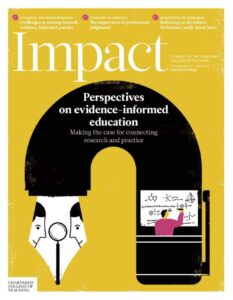Being a teacher in an actively inquiring school: A question of ‘scruples’?

The one constant in every teacher’s world is change, even if it is only the annual appearance of new faces and personalities in your classroom. Over the last 40 years, the initiator of change has moved to and fro, from teacher, through school, to government and back (Hargreaves, 2000). Increasingly, however, it seems that teachers have struggled to find enough time or space in their professional lives to examine and improve their own practice. So it is really encouraging and exciting that, for once, legislation and professional interest have come together to promote interest in relating research to current practice, by teachers both becoming better informed as to what has been discovered and themselves being engaged in inquiry or research about their practice.
It is even more encouraging to hear of the numbers of teachers who are keen to respond and take advantage of this opportunity – the number of teachers, for example, prepared to give up a Saturday to attend a researchEd event, or the schools I have visited in the last 18 months where the engagement with research is genuinely wholehearted. Specifically, I was privileged, in 2013, to lead a whole primary school staff in a one-year professional learning programme, where a stressed and time-pressured group of teachers discovered the real advantages of stepping back from the daily grind to observe their pupils’ learning and to research, devise, trial and evaluate a series of interventions.
The last thing I want to do is to cast a shadow of gloom over all this positivity, but I would suggest that there are several aspects of involvement in research that should be considered, discussed and planned, before rushing in to try out a new intervention. In this article, I am offering two aspects for your consideration: the importance of evaluating the effects or outcomes of any research-based intervention, and the importance of being able to be honest about the findings.
As a bit of background, you might want to look at the accounts of the pilot research that I have been conducting with Hazel Bryan into the approach of a sample of senior leaders in schools to teacher research (Bryan and Burstow, 2016). We had become interested in what we saw as mixed messages about the methodologies and ethics of teachers conducting their own research programmes within their own classrooms, and took the opportunity to interview heads and other senior team members across a variety of schools. The one common factor in all the interviews was that when we asked ‘Is there a point at which teacher-inquiry turns into teacher-research?’ – closely followed by ‘If there is a difference, then are there different ethical issues for a teacher–pupil and a researcher–participant role?’ – all the senior leaders, some for the first time in the interview, stopped and thought deeply about their responses. Several interviewees admitted that this was the first time they had considered the question at all. All interviewees acknowledged the importance of the questions.
To return to the two aspects that are the subject of this article, in terms of evaluation, you may well already have an idea of the concept of a fair test – one that as far as possible identifies and accounts for any effects produced by factors other than the subject of the intervention. Scientists, both physical and social, go to some lengths to control these confounding variables. The example below gives you an example of a case where teachers/researchers might be called upon to decide where their loyalties lie – to their pupils or to the research within their school.
The question of honesty seems to be silly, I know. We are not a profession devoted to untruth – far from it. However, researchers in the ‘hard’ sciences have been presented with this issue on occasion, where the investment in research ‘demands’ a particular result. It is not beyond the bounds of possibility for a similar pressure to be felt in a school context, and the second example gives you an actual case to consider. To ask questions about honesty is also to open the way to broader issues of ‘doing the right thing’ or behaving ethically (Stutchbury and Fox, 2009).
This is not to be prescriptive. I am interested in how you as teachers and school leaders feel about these two things. As Hazel and I asked in our research, do they (and you) view ‘inquiry’ and ‘research’ as being different, for example? If they are different, then how do you define the watershed between one and the other, and are there any different behaviours or approaches that may need thinking about as the boundary is crossed?
As I mentioned earlier, it made our senior leadership team (SLT) participants think deeply. Their answers began to reveal a range of responses, ranging from ‘there is no difference’ to ‘it’s only research if you publish it’ and ‘it’s only research if you are doing it with the help of a university – probably as part of a Master’s course’. I think there are truths here, but I would want to include the rigour of the research preceding the design stage, and the clarity and depth of the evaluation process as other discriminating factors. In this, I agree with the need for an understanding of social science research techniques – but it doesn’t necessarily need a university tutor to be on hand. It is quite possible for a school to be devising and evaluating its own research, but the knowledge of social science research design and methodology needs to be there, probably through suitably qualified members of staff.
What I want to share with you is a couple of examples from current practice in two schools, and I would then be interested in hearing your thoughts on the following: Do these accounts resonate with your own experience? What would you do (this is the ‘scruples’ bit) if you found yourself in a similar situation – and why? This is why I have put boxes marked ‘pause’ in the text. The comments inside these boxes are not exclusive – you will find other things that I have missed – but these are the issues that I have found were of concern to many of the teachers and senior leaders whom I have spoken to already in my research over the last three years.
First example
This is from a three-form-entry primary school, where the head is very keen to promote inquiry across the whole staff. In every research cycle in the school – and there are two or three a year – the head, with the SLT, identifies three key areas for development, and then hands responsibility for research, trialling and evaluation of each of these areas to one of three teams. The teams are led by an assistant head and made up of one teacher from each year. Thus, in every year group, there are three teaching groups, each focusing on a different development area.
The research teams meet every other week for planning and feeding back on progress. The head reports that most of the teaching staff use the alternate weeks to meet in year or key stage teams. These meetings will be the usual business that occupies all teachers, but may also, inevitably, include discussion about the current inquiry topics.
This latter presents the head with a problem. She would like to be able to see evaluation data, confident that any effects recorded can be ascribed to a single specific intervention. However, once a particular development looks to be succeeding in one teacher’s class, the other two in the same year tend to adopt it – thus muddying the waters from her point of view.
Pause for a moment:
What do you see as the issues here – for the head as well as the teaching staff?
What would you do in this situation – both as teacher and as head?
Second example
This comes from a 10-form-entry, all-ability secondary school. Here, the head and SLT are enthusiastic supporters of research-informed teaching and have developed a programme similar to the ‘Singapore model’ – that is, where departments are encouraged to discuss a series of research ideas and writings, with a view to trialling them in their classes. However, there is concern expressed by the SLT member responsible for professional learning that staff feel a compulsion to only report evaluations that are exclusively positive, as the school leadership has also embraced performance-related pay, and the reported outcomes of these interventions are seen, by the staff, as influencing this process.
This SLT member feels that the rigour of the inquiry process is being undermined and that any genuine positive effects may be negated by this conflation of two policies, whether or not this was the intention.
Pause again:
Once again, there are two viewpoints for consideration: that of the teachers and departments, and that of the head and her senior team.
Try the exercise, putting yourself in another colleague’s position:
If you are not an SLT member at present, what might you do to correct this (if that’s what you think needs to be done)?
If you position yourself as a head of department, or a teacher within the department, what might you be able to do to counteract this unintended outcome?
I look forward to reading your thoughts and responses, either through the Chartered College of Teaching or my own contact details. Our research in this area is continuing, with further formal interviews and collected opinions from across the country. We are keen to acquire as broad a spread of opinion as we can, so do feel free to contribute.
What strikes me about these two questions is the light they shed on the implied qualities of the relationship between the SLT and the teaching staff. It is difficult, in a short piece like this, to avoid oversimplification, but I have been struck by the trust shown by the SLT of the most successful research-engaged schools towards their teaching staff. There is also the desire to be involved. The year-long primary school intervention I mentioned at the start of this article would not have been the success it was without the head insisting on taking part as a (part-time) teacher of a class. The sense of being part of a ‘learning academy’ was powerful and motivating for everyone – including myself.
Over to you…
References
Bryan H and Burstow B (2016) Leaders’ views on the values of school-based research: Contemporary themes and issues. Professional Development in Education: 1–17.
Hargreaves A (2000) Four ages of professionalism and professional learning. Teachers and Teaching: Theory and Practice 6: 151–182.
Stutchbury K and Fox A (2009) Ethics in educational research: Introducing a methodological tool for effective ethical analysis. Cambridge Journal of Education 39: 409–504.










